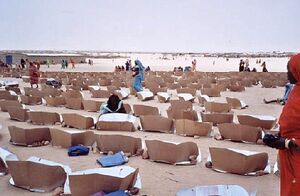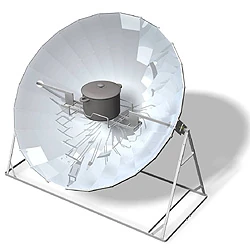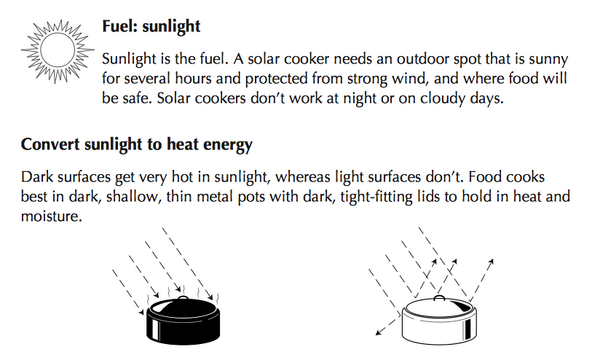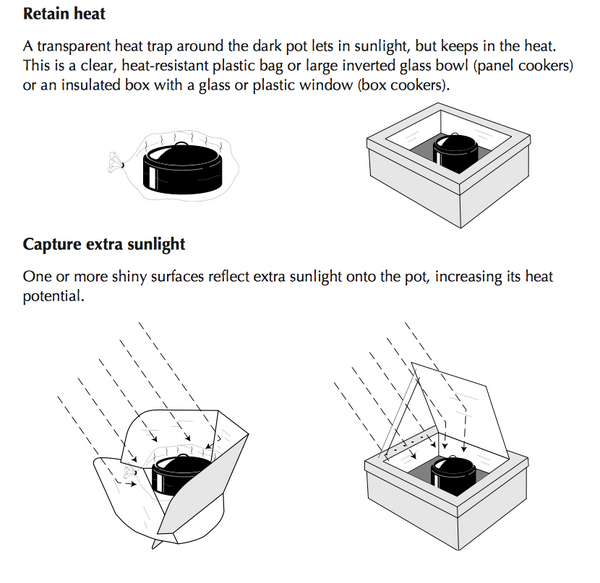Tom Sponheim (talk | contribs) |
Paul Hedrick (talk | contribs) mNo edit summary Tag: sourceedit |
||
| (33 intermediate revisions by 2 users not shown) | |||
| Line 1: | Line 1: | ||
__NOTOC__ |
__NOTOC__ |
||
{{GoogleTranslateLinks}} |
{{GoogleTranslateLinks}} |
||
| + | {{Updated|2|26|15}} |
||
| + | ==Buy or build a solar cooker== |
||
| + | [[File:KoZon_Iridimi_May_2007_1.jpg|thumb|300px|Tens of thousands of solar cookers are in use in [[refugee camps]] in Chad, as well as the many solar cookers used daily in developed and developing countries around the world.]] |
||
| ⚫ | Highlighted below is a collection of articles about solar cooking basics. If you are interested in trying solar cooking for the first time yourself, you may be wondering whether it is best to [[:Category:Solar cooker plans|build your own solar cooker]], or to [[:Category:Manufacturers and vendors|buy a finished solar cooker commercially]]. Building your own solar cooker can be fairly easy and inexpensive way to go. Various types of solar cookers that are available to build are listed at [[:Category:Solar cooker plans|build a solar cooker]]. You will find information there comparing the [http://solarcooking.wikia.com/wiki/Category:Solar_cooker_plans#Selected_designs advantages and disadvantages] of each style of cooker. There are also many solar cookers available commercially. Commercial cookers are typically well made, and waterproof. The location of the retailer will be important to consider to avoid high shipping costs. See possibilities at [[:Category:Manufacturers and vendors|buy a solar cooker]]. |
||
| + | ==How do solar cookers work?== |
||
| + | Below is the basic science for [[solar panel cookers]] and [[solar box cookers]]. |
||
| ⚫ | |||
| + | |||
| + | [[File:Solar_Cooking_basics,_SCI_2004,_pg._1,_12-9-14.png|none|600px]] |
||
| + | [[File:Solar_Cooking_basics,_SCI_2004,_pg._2,_12-19-14.png|none|600px]] |
||
| + | |||
| + | |||
| + | |||
| + | ===<u>Parabolic solar cookers</u>=== |
||
| + | [[Image:AlSol 1.4.jpg|thumb|300px|An [[AlSol 1.4]] parabolic cooker demonstrates where the cook pot is supported to receive the focussed light from the reflector.]] |
||
| + | The other main variety of cookers are called [[parabolic solar cooker]]s. They use a bowl shaped reflector to focus the light more directly onto the cook pot, usually from below. The parabolic name refers to the shape of the curve of the reflector cross-section. |
||
| + | |||
| + | They will require more frequent reorientation to the sun, possibly every 10 minutes, but they cook food more quickly at higher temperatures compared to other solar cookers. They also have the ability to fry foods. Generally parabolic solar cookers will need to be attended to more than box or panel cookers to avoid possibly burning the food at the bottom of the cook pot. |
||
| + | |||
| + | |||
| + | |||
| + | More information about solar cookers can be found at: [[How solar cookers work|how solar cookers work]] |
||
| + | |||
| + | ==Cooking with your solar cooker== |
||
| + | The golden rule for solar cooking is; 'Get your food cooking early in the day, and do not worry about overcooking'. Most people starting to solar cook will be using a [[solar panel cooker]] or [[solar box cooker]]. These cookers are oriented to the sun and need to be reoriented approximately once an hour over a typical three to four hour cooking period. Add much less water to the recipe than you would use cooking with more conventional stoves and ovens. Cooking food does not need to be stirred, and is best left covered while solar cooking. |
||
Once you have decided on a cooker, you will need to find appropriate [[Solar cooking pots|cookware]]. Thin-walled dark enameled metal cook pots work well. They are good at heating up quickly. Cast iron pots also work, and are typically preheated in the solar cooker before cooking. The advantage of the heavier pots is that they will help maintain an even cooking temperature if the sun is occasionally blocked by clouds, but most solar cooks seem to use the enamel pots. Because dark cooking pots work the best in solar cookers, it is important to remember to use a [[Paint|nontoxic paint]] for the exterior cook pot surface if you choose to darken your own pots. |
Once you have decided on a cooker, you will need to find appropriate [[Solar cooking pots|cookware]]. Thin-walled dark enameled metal cook pots work well. They are good at heating up quickly. Cast iron pots also work, and are typically preheated in the solar cooker before cooking. The advantage of the heavier pots is that they will help maintain an even cooking temperature if the sun is occasionally blocked by clouds, but most solar cooks seem to use the enamel pots. Because dark cooking pots work the best in solar cookers, it is important to remember to use a [[Paint|nontoxic paint]] for the exterior cook pot surface if you choose to darken your own pots. |
||
| − | Consider the type of foods you will be preparing in your cooker. [[Solar panel cookers]] and [[solar box cookers]] are simple to use, and are best at baking and slow cooking, similar to crockpot cooking. [[parabolic solar cooker|Parabolic solar cookers]] will require frequent reorientation to the sun, but have the ability to fry foods and cook food on a griddle. [[Cooking guidelines]] will explain the best way to prepare specific food types. There are also many [[Recipes|recipes]] of proven approaches to great dishes, but basically, most any recipe will work with the right solar cooker, by simply allowing for more cooking time. Most solar cooks will advise to not add much extra liquid when cooking, as you might do with traditional stovetop cooking. The natural juices of the food are retained when solar cooking. |
+ | Consider the type of foods you will be preparing in your cooker. [[Solar panel cookers]] and [[solar box cookers]] are simple to use, and are best at baking and slow cooking, similar to crockpot cooking. [[parabolic solar cooker|Parabolic solar cookers]] will require frequent reorientation to the sun, but have the ability to fry foods and cook food on a griddle. [[Cooking guidelines]] will explain the best way to prepare specific food types. There are also many [[Recipes|recipes]] of proven approaches to great dishes, but basically, most any recipe will work with the right solar cooker, by simply allowing for more cooking time. Most solar cooks will advise to not add much extra liquid when cooking, as you might do with traditional stovetop cooking. The natural juices of the food are retained when solar cooking. |
| + | |||
| − | |||
==Introductory articles== |
==Introductory articles== |
||
*[[Why solar cooking is important]] |
*[[Why solar cooking is important]] |
||
| Line 14: | Line 37: | ||
*[[Where is solar cooking possible?]] |
*[[Where is solar cooking possible?]] |
||
*[[The case for solar cooking]] |
*[[The case for solar cooking]] |
||
| + | *[[Most significant solar cooking projects]] |
||
*[[Media:The Case for Solar Thermal Cooking.pdf|The Case for Solar Thermal Cooking: Free Fuel—Zero Emissions]] |
*[[Media:The Case for Solar Thermal Cooking.pdf|The Case for Solar Thermal Cooking: Free Fuel—Zero Emissions]] |
||
| + | *[[United Nations Millennium Development Goals]] |
||
*[[:Category:Solar cooker plans|Build a solar cooker]] |
*[[:Category:Solar cooker plans|Build a solar cooker]] |
||
*[[:Category:Manufacturers and vendors|Buy a solar cooker]] |
*[[:Category:Manufacturers and vendors|Buy a solar cooker]] |
||
*[[Health and safety]] |
*[[Health and safety]] |
||
| + | *[[How to start solar cooking]] |
||
*[[The history of solar cooking]] |
*[[The history of solar cooking]] |
||
*[[Solar cooking frequently-asked questions]] |
*[[Solar cooking frequently-asked questions]] |
||
| Line 26: | Line 52: | ||
*[[Emergency preparedness|Solar cooking and emergency preparedness]] |
*[[Emergency preparedness|Solar cooking and emergency preparedness]] |
||
*[[Promoting solar cooking]] |
*[[Promoting solar cooking]] |
||
| + | *[[Q&A on Solar Cooking]] |
||
==Introductory Manual== |
==Introductory Manual== |
||
| Line 34: | Line 61: | ||
desc none |
desc none |
||
</imagemap> |
</imagemap> |
||
| − | [[Media:CooKit_plans_detailed.pdf|Solar Cookers: How to Make, Use, and Enjoy]] |
+ | *[[Media:CooKit_plans_detailed.pdf|Solar Cookers: How to Make, Use, and Enjoy]] |
| + | *(There are also detailed versions in Arabic ([[Media:CooKit_ar.pdf|Standard]], [[Media:Solar Oven Instructions Arabic.pdf|Variation]]), [[Media:CooKit_french_plans.pdf|French]], [[Media:CooKit Plans detailed Spanish.pdf|Spanish]], and [[Media:Solar_cookit_nairobi_booklet.pdf|English for Kenya]], and [[Media:CooKit - Galician.pdf|Galician]].) |
||
| + | |||
| + | * [http://www.isf-cameroun.org/sites/default/files/cookers_english_BD.pdf Construction of Solar Cookers and Driers] - ''Christelle Souriau & David Amelin'' (This is an excellent overview of solar cooking basics and simple solar cooker and dryer construction methods.) |
||
==Reports== |
==Reports== |
||
==Audio and video== |
==Audio and video== |
||
| + | [[File:Solar Cooking in Africa - A Remarkable Technology Transfer|500px|none]] |
||
| − | *[http://www.youtube.com/watch?v=R-_4g0Omtsw&feature=player_embedded Nature-Powered Cooking] |
||
| − | *[http://personnel.awr.org/Misiani/Ray/Solar%2520cooking%2520nov.07.2002.mp3 Short audio piece on solar cooking by Adventist World Radio] |
||
| − | *[http://www1.voanews.com/SpecialEnglish/article.cfm?objectID=D2DC5F52-C3B5-4F2F-99EC66F4E6BECC21&title=DEVELOPMENT%2520REPORT%2520%2596%2520Solar%2520Cookers Listen to 2005 Voice of America report on solar cooking] |
||
| − | *[http://www.voanews.com/SpecialEnglish/article.cfm?objectID=FD3E6146-1048-4E66-AF5ECDFC3F971BE9&Title=DEVELOPMENT%20REPORT%20%96%20May%2013,%202002:%20Solar%20Cookers&db=current The Voice of America broadcast their Special English Development Report with solar cooking as the subject matter.] |
||
==See also== |
==See also== |
||
| Line 54: | Line 81: | ||
==External links== |
==External links== |
||
| − | *[http://solarcooking.org/kerr.htm The Expanding World of Solar Box Cookers] - ''[[Barbara Kerr]]'' |
+ | *[http://solarcooking.org/kerr.htm The Expanding World of Solar Box Cookers] - ''[[Barbara Kerr]]'' (This is the full-text of the book by this solar cooking pioneer) |
| + | * [http://www.isf-cameroun.org/sites/default/files/cookers_english_BD.pdf Construction of Solar Cookers and Driers] - ''Christelle Souriau & David Amelin'' (This is an excellent overview of solar cooking basics and simple solar cooker and dryer construction methods.) |
||
| − | |||
*Three part series by Sharon Cousins on practical, humanitarian, and environmental aspects and potentials of solar cooking: [http://valeriecomer.com/?p=1113 Solar Cooking: Clean, Bright and Accessible],[http://valeriecomer.com/?p=1313 Out of the Smoke, Into the Sun], and [http://valeriecomer.com/?p=1438 Cleaner Cooking, Healthier Planet] |
*Three part series by Sharon Cousins on practical, humanitarian, and environmental aspects and potentials of solar cooking: [http://valeriecomer.com/?p=1113 Solar Cooking: Clean, Bright and Accessible],[http://valeriecomer.com/?p=1313 Out of the Smoke, Into the Sun], and [http://valeriecomer.com/?p=1438 Cleaner Cooking, Healthier Planet] |
||
[[Category:Introduction to solar cooking]] |
[[Category:Introduction to solar cooking]] |
||
Revision as of 16:36, 26 February 2015
|
Last edited: 26 February 2015
|
Buy or build a solar cooker

Tens of thousands of solar cookers are in use in refugee camps in Chad, as well as the many solar cookers used daily in developed and developing countries around the world.
Highlighted below is a collection of articles about solar cooking basics. If you are interested in trying solar cooking for the first time yourself, you may be wondering whether it is best to build your own solar cooker, or to buy a finished solar cooker commercially. Building your own solar cooker can be fairly easy and inexpensive way to go. Various types of solar cookers that are available to build are listed at build a solar cooker. You will find information there comparing the advantages and disadvantages of each style of cooker. There are also many solar cookers available commercially. Commercial cookers are typically well made, and waterproof. The location of the retailer will be important to consider to avoid high shipping costs. See possibilities at buy a solar cooker.
How do solar cookers work?
Below is the basic science for solar panel cookers and solar box cookers.
Parabolic solar cookers

An AlSol 1.4 parabolic cooker demonstrates where the cook pot is supported to receive the focussed light from the reflector.
The other main variety of cookers are called parabolic solar cookers. They use a bowl shaped reflector to focus the light more directly onto the cook pot, usually from below. The parabolic name refers to the shape of the curve of the reflector cross-section.
They will require more frequent reorientation to the sun, possibly every 10 minutes, but they cook food more quickly at higher temperatures compared to other solar cookers. They also have the ability to fry foods. Generally parabolic solar cookers will need to be attended to more than box or panel cookers to avoid possibly burning the food at the bottom of the cook pot.
More information about solar cookers can be found at: how solar cookers work
Cooking with your solar cooker
The golden rule for solar cooking is; 'Get your food cooking early in the day, and do not worry about overcooking'. Most people starting to solar cook will be using a solar panel cooker or solar box cooker. These cookers are oriented to the sun and need to be reoriented approximately once an hour over a typical three to four hour cooking period. Add much less water to the recipe than you would use cooking with more conventional stoves and ovens. Cooking food does not need to be stirred, and is best left covered while solar cooking.
Once you have decided on a cooker, you will need to find appropriate cookware. Thin-walled dark enameled metal cook pots work well. They are good at heating up quickly. Cast iron pots also work, and are typically preheated in the solar cooker before cooking. The advantage of the heavier pots is that they will help maintain an even cooking temperature if the sun is occasionally blocked by clouds, but most solar cooks seem to use the enamel pots. Because dark cooking pots work the best in solar cookers, it is important to remember to use a nontoxic paint for the exterior cook pot surface if you choose to darken your own pots.
Consider the type of foods you will be preparing in your cooker. Solar panel cookers and solar box cookers are simple to use, and are best at baking and slow cooking, similar to crockpot cooking. Parabolic solar cookers will require frequent reorientation to the sun, but have the ability to fry foods and cook food on a griddle. Cooking guidelines will explain the best way to prepare specific food types. There are also many recipes of proven approaches to great dishes, but basically, most any recipe will work with the right solar cooker, by simply allowing for more cooking time. Most solar cooks will advise to not add much extra liquid when cooking, as you might do with traditional stovetop cooking. The natural juices of the food are retained when solar cooking.
Introductory articles
- Why solar cooking is important
- How solar cookers work
- Where is solar cooking possible?
- The case for solar cooking
- Most significant solar cooking projects
- The Case for Solar Thermal Cooking: Free Fuel—Zero Emissions
- United Nations Millennium Development Goals
- Build a solar cooker
- Buy a solar cooker
- Health and safety
- How to start solar cooking
- The history of solar cooking
- Solar cooking frequently-asked questions
- Solar cooking tips and tricks
- Recipes
- Cooking guidelines
- Solar cookbooks
- Solar cooking and emergency preparedness
- Promoting solar cooking
- Q&A on Solar Cooking
Introductory Manual
- Solar Cookers: How to Make, Use, and Enjoy
- (There are also detailed versions in Arabic (Standard, Variation), French, Spanish, and English for Kenya, and Galician.)
- Construction of Solar Cookers and Driers - Christelle Souriau & David Amelin (This is an excellent overview of solar cooking basics and simple solar cooker and dryer construction methods.)
Reports
Audio and video
See also
- Developing an intuitive feel for the dynamics of solar cooking
- In-depth look at solar cooking - Dr. Ed Pejack
- Compendium of solar cooker designs
- All solar cooker designs
- Principles of Solar Box Cooker Design
- Affordable Solar Cookers For The Neediest - Beverly L. Blum
External links
- The Expanding World of Solar Box Cookers - Barbara Kerr (This is the full-text of the book by this solar cooking pioneer)
- Construction of Solar Cookers and Driers - Christelle Souriau & David Amelin (This is an excellent overview of solar cooking basics and simple solar cooker and dryer construction methods.)
- Three part series by Sharon Cousins on practical, humanitarian, and environmental aspects and potentials of solar cooking: Solar Cooking: Clean, Bright and Accessible,Out of the Smoke, Into the Sun, and Cleaner Cooking, Healthier Planet




